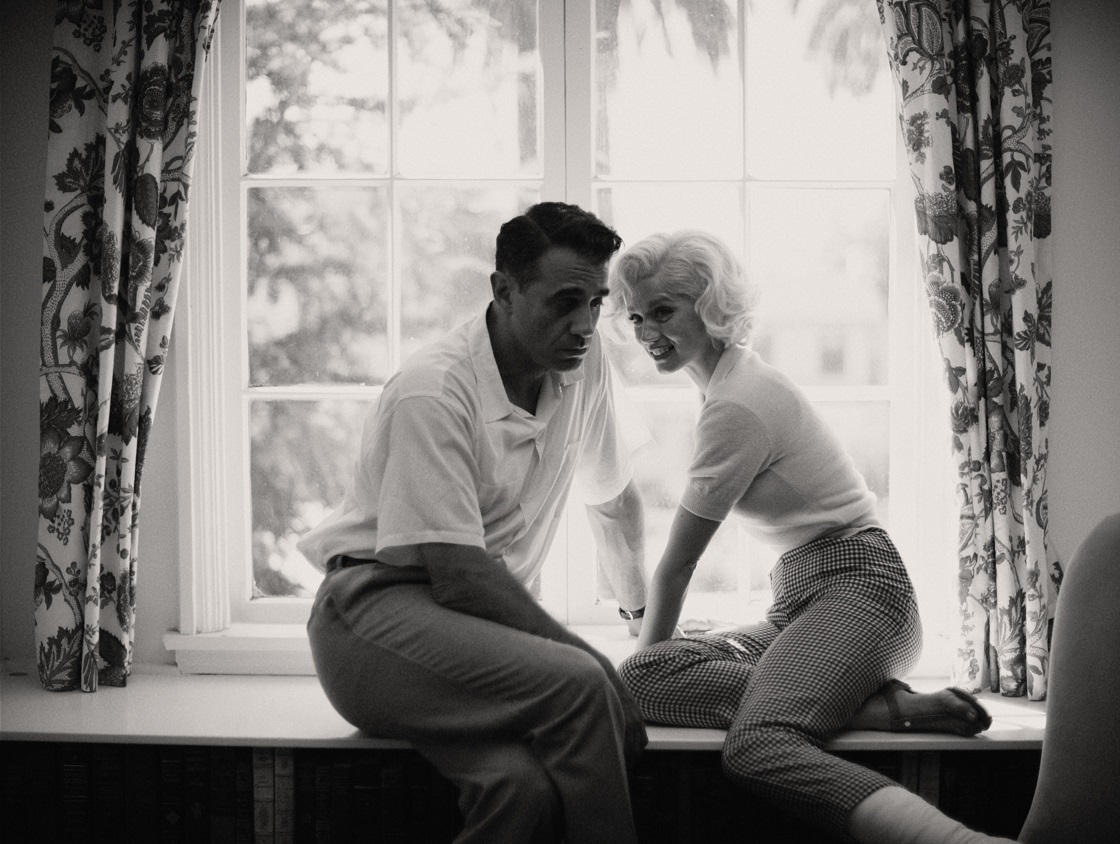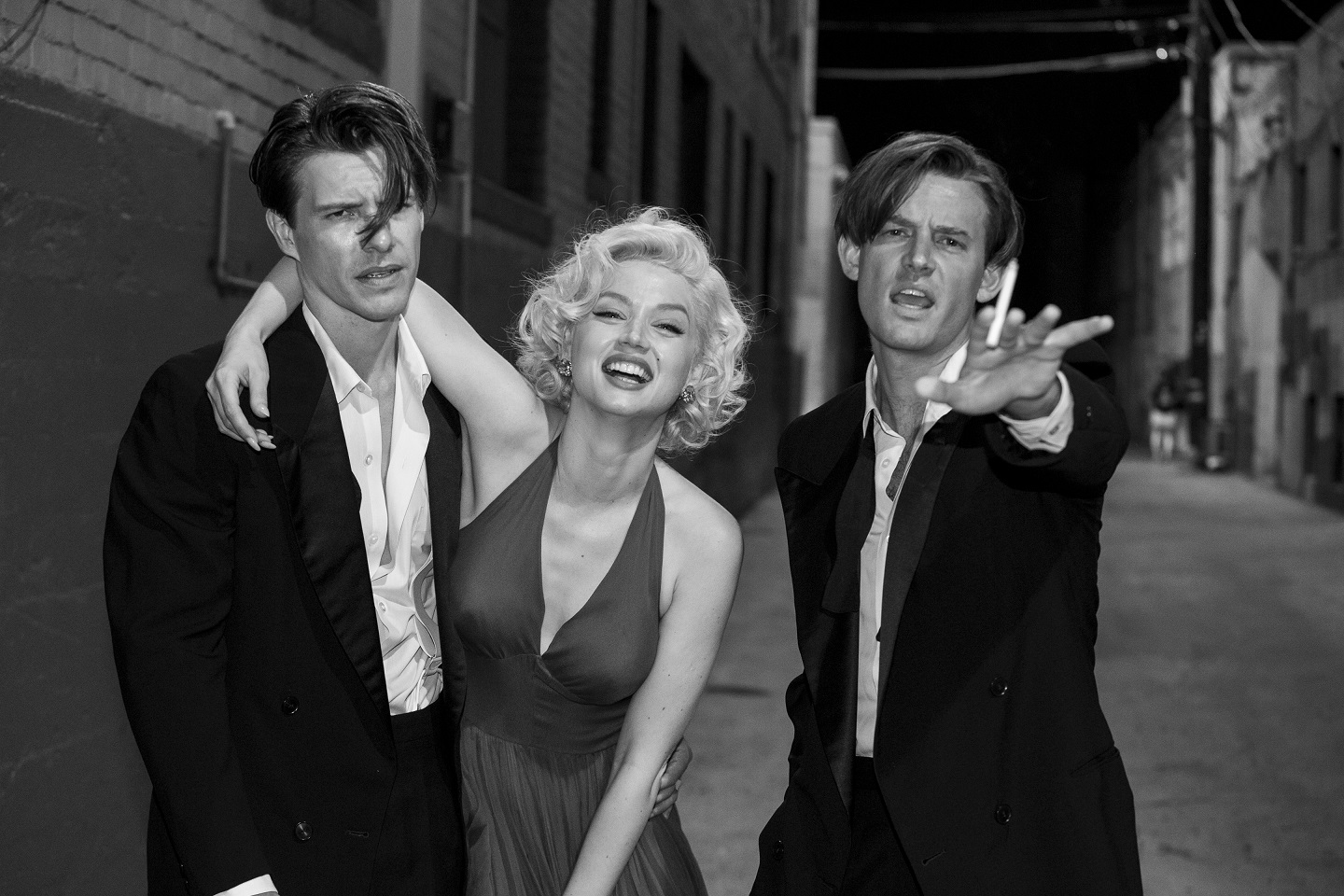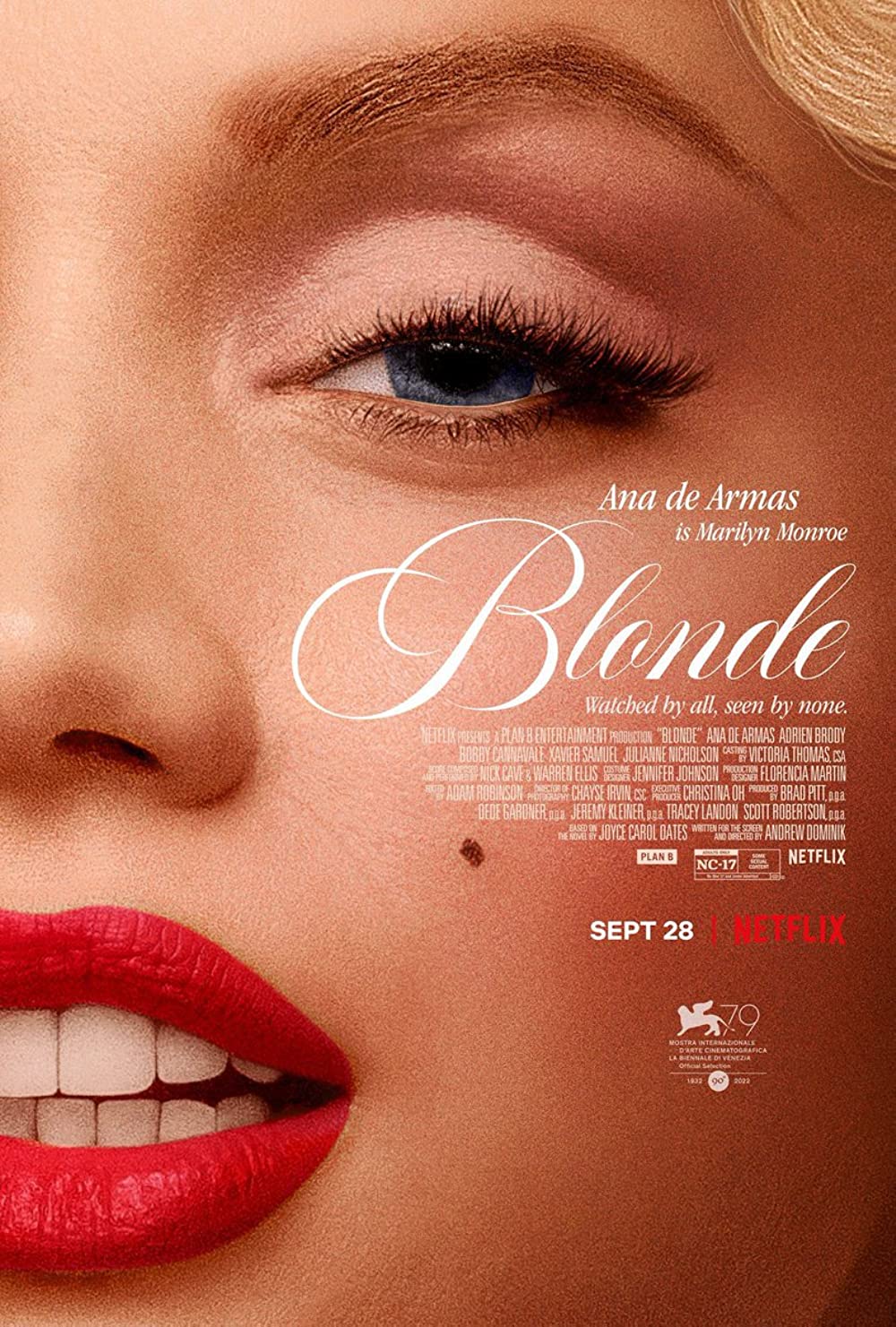Blonde cannot be saved by Ana de Armas’ career-defining work. It’s nothing but an excruciatingly vapid & voyeuristic depiction of Norma Jean’s abuse.

Blonde is not good.
That’s the most honest way of start a review for such a gnarly, gratuitous, exploitative journey through suffering and abuse. It’s no secret that the Hollywood of the 50s and 60s explored Marilyn Monroe to no end – it’s well documented how Norma Jean Mortenson hid away her own self and created a character who could relish the spotlight and be the star, as she needed to disassociate from what the system and the “higher ups” had put her through just to get placed in that position, not to mention the harrowing abuse already endured during her childhood.
Andrew Dominik’s Blonde is exploitative, that is its aim, as based on the best-selling fictional portrait of the icon’s life by Joyce Carol Oates. It commits to paint a picture of Marilyn the same exact way the Hollywood of her time did, and there is nothing inherently wrong with depicting an imaginary version of someone’s life – particularly someone who spent so much of their time in the public eye. But there is a way to achieve this that celebrates the person behind the icon, a way that treats the subject manner with grace and respect, or at the very least adds some commentary to either what is already known or to the fiction that it so proudly aims to perpetuate.

The events of Jackie didn’t happen; but it captured with nuance the grieving of a powerless wife whose suddenly has to heal an entire nation, with no time to heal herself. The weekend depicted in Spencer didn’t happen either, but Larrain offers a tender, compassionate look at the anguish Diana Spencer felt while imprisoned in her marriage, and in her family who proudly wanted her to be anyone else other than herself.
This problematic parading over the corpse of a real human being’s abuse and trauma offers no grace or decorum, it merely seeks to display the trauma through fictional situations that feel as if they thrive on how gross and off-putting they can be. This blame is no fault of Dominik, who injects electrifying Lynch-ian qualities to the way he captures the dichotomy between Norma Jean and Marilyn – one a real, breathing human being, the other a made-up character created to save a young woman who tried to cope with the abuse of Hollywood’s superfluous glamour and bright lights.
Marilyn could be who the hounding public craved, who the villainous, violent executives used and exploited, she could be the star on screen and the victim of those Norma Jean sought to save herself from. Having to live with that she could just be herself behind the make-up, in the shadows, a young girl who just wanted to be loved for who she was, not what she looked like. But Blonde isn’t interested in that, rather more interested in stripping Norma Jean of any agency in the supposed story of her life. Again this offers no commentary or insight into already known information, it’s just trauma porn.

The men in Norma/Marilyn’s life come as fast as they go. As Blonde unfolds, the violent sexual trauma showcased Norma goes through only grows in length and in graphic detail: illustrating how Marilyn Monroe appears as a coping construct. She is Norma’s way of protecting herself, pushing the trauma away as she disassociates into the provocative persona that the press is obsessed with.
This is, on the surface, a depiction of Dissociative Identity Disorder: blackouts, lost time, fuzzy faces and disorientation. But Blonde accomplishes nothing beyond the surface as it more so paints this in a way that blames and villainizes Norma Jean for all the lost jobs, failed marriages, and even abortions, because she couldn’t both herself and Marilyn. The film aims to framed her more as a hard-to-work-with manic person who created her own downfall, not so much as that was caused by trauma and abuse at the hands of the Hollywood that so craved every inch of her person.
Much like Dominik can’t be (entirely) blamed for this depiction: so cannot Ana De Armas who faultlessly transforms into Norma. From the way her voice switches depending on who she’s speaking to, from a professional conversation regarding her work to a care-free talk where she calls the men closest to her “daddy”. She is absolutely hypnotizing to watch where some times she gradually transforms while others she changes in a snap. It’s as if she is testing herself, carrying herself through this drudgery of a superficial look at the ill-concepted portrait of life.
De Armas is the most consistent aspect in this dreadful vignette filled, overly long, harrowing exploration of abuse where the visual artistry gets lost in its self-overindulgence as the pointlessly ever-changing aspect ratios, or the shifts between detract instead of benefiting such a skilled performance. Black & white transforms back & forth to color, on principle these visual framing devices at one point serve a purpose, but much like the film isn’t trying to make any particularly compelling points about Marilyn, all the artistic storytelling techniques lose their effect and meaning.

The absolute lack of agency Marilyn has in her own life, as depicted here, is the most hurtful thing. Every man distrusts her intellect, consistently forcing the idea that Norma Jean is but a puppet, but the film doesn’t aim to comment on it. Instead it distantly depicts a gruesome forced abortion scene as Marilyn is restrained by a studio who wants her to perform in Gentlemen Prefer Blondes.
Not dissimilar to how in 2022 America still allows for women’s reproductive rights to be handled by men with their own self-serving interests in mind but Dominik’s direction, along with the editing take away from what could be a scene with purpose in capturing pain and vulnerability and instead creates a frustrating film with absolutely no heart that does not interest itself in compassionately exploring a woman’s pain. It instead prioritizes rapidly moving on to the next abusive moment in her life, which it seeks to capture with as much pomp & circumstance as the spotlight that Norma Jean so arduously tried to escape from.

Ana de Armas’ emotive performance is so much more than the script deserves, front and center through the entire, much like Marilyn was, she attempts to convey emotion in an emotionless story with no interest in showing the compassion her eyes display, no interest in intimacy with Norma Jean, with her inner struggle. A harrowing and superfluous exploitation of a harmful ideal of who Marilyn was, it recognizes her pain, but says nothing about her, never condemning her abusers, but instead pilling on her very real suffering with fictional, unnecessary circumstances.
BLONDE cannot be saved by Ana de Armas’ career-defining work. It’s nothing but an excruciatingly vapid & voyeuristic depiction of Norma Jean’s abuse with unrelenting coldness for her tragic life & career. More of a collection of abusive vignettes instead of a compassionate, deep-diving narrative that naturally flows through her entire being, that aims to have something to say. Skip this empty, gratuitous, uncaring & exploitative add-on to the icon’s suffering. She deserves to live forever, this movie: does not.
FINAL GRADE: D+
NEXT: Don’t Worry Darling Review
About Blonde
Based on the bestselling novel by Joyce Carol Oates, Blonde boldly reimagines the life of one of Hollywood’s most enduring icons, Marilyn Monroe. From her volatile childhood as Norma Jeane, through her rise to stardom and romantic entanglements, Blonde blurs the lines of fact and fiction to explore the widening split between her public and private selves.
Blonde comes to theaters on September 16th
and Netflix on September 28th.

Renato Vieira. 28.
Film Critic/Screenwriter from London UK
Masters Degree in Film Directing.
EIC of YouTube Channel “Ren Geekness”.


